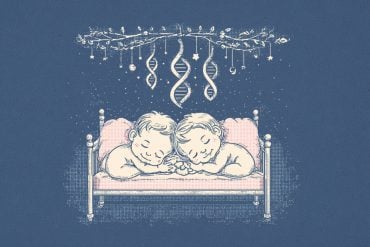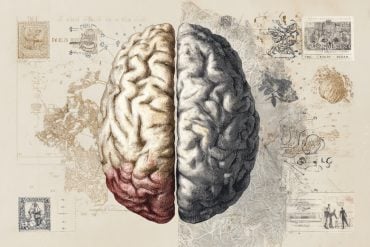Summary: Men who have poor co-parenting relationships with their partners in the months following the birth of their child are more likely to be depressed by the time their children are toddlers.
Source: Karolinska Institute
Dads are more likely to feel depressed when their kids are toddlers if their coparenting relationships are poor in the months after birth, a new study by researchers at Karolinska Institutet in Sweden shows. The findings are published in the Journal of Affective Disorders.
“We have a lot to gain as a society if we support co-parenting relationships more during the early stages of parenthood,” says Michael Wells, associate professor at the Department of Women’s and Children’s Health, Karolinska Institutet.
“One way to do that is to screen fathers for their co-parenting status during infancy and toddlerhood and to offer interventions aimed at improving collaboration and communication around the child if needed.”
Around 9-10 percent of dads experience postpartum depression, which is high compared with the overall population. Children who grow up with depressed dads are also at a higher risk of mental, emotional, and behavioral problems in their youth, according to prior research. By identifying modifiable factors that reduce the risk of depression in dads, researchers hope to develop interventions that can prevent mental illness in both parents and children.
In the current study, 429 fathers of infants up to two years old in Sweden were recruited on Facebook. The participants were asked to complete questionnaires where they ranked symptoms of depression and the nature of their co-parenting relationships. Data were collected at three-time points when the children were on average 8, 13, and 26 months old. About 20 percent of dads reported symptoms of depression at some point during the study.
According to the findings, two-thirds of fathers with exceptionally poor co-parenting relationships during the first year after birth are likely to have symptoms of depression when their children become toddlers. Conversely, fathers with higher co-parenting scores are more likely to have fewer symptoms of depression. The researchers also found associations between depression at earlier stages and worse co-parenting relationships later on.

“We found bidirectional associations between depression and poor co-parenting, meaning these two factors seem to influence each other in both directions. However, the strongest predictor for the development of depression was a poor co-parenting relationship in the early stages of childhood, as compared to the other way around,” Michael Wells says.
In Sweden, fathers are currently screened for symptoms of depression three to five months after birth while mothers are screened when the baby is six to eight weeks old. According to the researchers, an effective depression prevention strategy could be to complement with additional screening and support regarding the co-parenting relationship.
The study has some limitations. For example, the participants had higher incomes and more symptoms of at least mild depression than the average Swedish population.
The researchers note that the study only looked at the experience of those who self-identified as fathers and therefore it is unclear if the results would generalize to other parents.
The study was financed by a grant from Region Stockholm.
What is a co-parenting relationship?
- A co-parenting relationship differs from an intimate relationship in that it focuses more on the collaboration between the parents around the child.
- It typically covers four areas: 1) agreement or disagreement on how to raise the child, 2) support or undermining of the other’s parental abilities, 3) collaboration around joint family standards, and 4) division of childrearing labor.
About this depression and parenting research news
Author: Press Office
Source: Karolinska Institute
Contact: Press Office – Karolinska Institute
Image: The image is in the public domain
Original Research: Closed access.
“Bidirectional associations between paternal postpartum depression symptoms and coparenting: A cross-lagged panel model of fathers of infants and toddlers” by Michael Wells et al. Journal of Affective Disorders
Abstract
Bidirectional associations between paternal postpartum depression symptoms and coparenting: A cross-lagged panel model of fathers of infants and toddlers
Background
Finding modifiable predictors of paternal depression symptoms is helpful for developing interventions. The aim is to assess the unidirectional and/or bidirectional associations between paternal postpartum depression symptoms and coparenting among fathers of infants and toddlers.
Methods
Longitudinal data were collected prospectively from 429 fathers of infants aged 0–24 months (median = 8 months) in Sweden, with 6- and 18-month follow-ups. All fathers participated in at least two of three waves of data collection, and multiple imputation was used for missing values. The Edinburgh Postnatal Depression Scale was used to detect depression symptoms (≥10 points), while the Brief Coparenting Relationship Scale measured the coparenting relationship. A cross-lagged panel model was used to estimate the associations between paternal depression symptoms and coparenting relationship quality over time, controlling for several known covariates and COVID-19 exposure.
Results
Fathers with higher coparenting scores at Time 1 and 2 had less depression symptoms at Time 3, and fathers with more depression symptoms at Time 2 had lower coparenting scores at Time 3. Plotted probabilities of having at least mild depression symptoms revealed a multifold increase in the probability of depression symptoms at Time 3 for fathers with minimal coparenting scores at Times 1 and 2, respectively, compared to fathers with mean coparenting scores at Times 1 and 2, respectively.
Limitations
Causal links cannot be determined using the current non-experimental study design. Using the EPDS alone may have missed some fathers with depression symptoms.
Conclusions
Clinicians seeking to reduce paternal depression symptoms should help strengthen the coparenting relationship.






